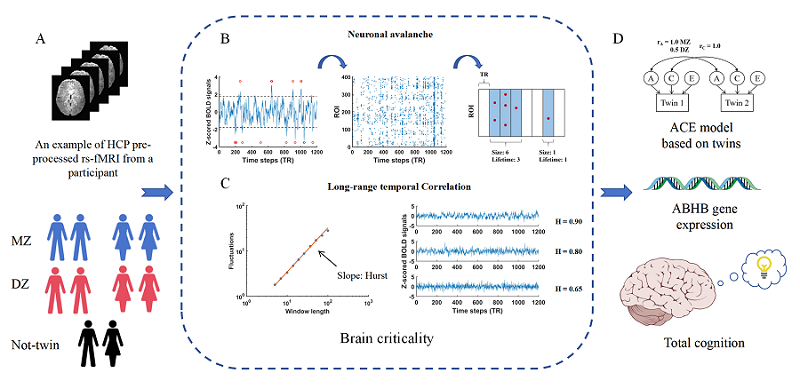Genes Shape Brain Criticality and Its Relationship with Cognitive Functions
Over the past two decades, accumulating evidence has suggested that the healthy brain operates near a critical state. Brain criticality, which reflects the balance between neural excitation and inhibition, is thought to optimize various brain functions and has been linked to several neurological disorders.
Despite these insights, a major gap remains: the genetic foundations of critical brain dynamics are still largely unknown. Moreover, given the functional advantages provided by criticality, it is vital to determine whether a genetic relationship exists between brain criticality and cognitive abilities.
In a study published on June 24, 2025, in PNAS, a research team led by Dr. LIU Ning from the Institute of Biophysics, Chinese Academy of Sciences (CAS), and Dr. YU Shan from the Institute of Automation, CAS, explored the genetic basis of brain criticality and its relationship with human cognitive functions. The team analyzed data from the Human Connectome Project (HCP) S1200 release, including resting-state fMRI (rs-fMRI) data from 250 monozygotic twins, 142 dizygotic twins, and 437 non-twin individuals, to assess how genetic factors shape critical brain dynamics.
Their analyses revealed that genetic factors significantly influence brain criticality across multiple spatial scales-from specific brain regions to large functional networks. Notably, the primary sensory cortex exhibited a stronger genetic impact compared to the association cortex.
By integrating rs-fMRI data with gene expression profiles from the Allen Human Brain Atlas, the researchers demonstrated that specific transcriptional patterns significantly explain the organization of regional brain criticality and are associated with particular biological processes and several brain disorders.
Importantly, the team established a genetic link between brain criticality and cognitive functions, suggesting a shared genetic foundation. This connection may deepen our understanding of how genetic factors contribute to optimal cognitive performance.
"Maintaining criticality is essential for brain function," said Dr. LIU Ning. "Confirming its genetic basis offers new perspectives for future research on brain function and neurological disorders."
This study paves the way for exploring the biological mechanisms underlying critical brain dynamics and their implications for brain health and function.

Schematic Diagram of the Heritability Estimation Pipeline for Critical Dynamics
(Image by LIU Ning's group)
Article link: https://doi.org/10.1073/pnas.2417010122
Contact: LIU Ning
Institute of Biophysics, Chinese Academy of Sciences
Beijing 100101, China
E-mail: liuning@ibp.ac.cn
(Reported by Prof. LIU Ning's group)

